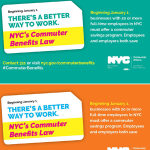 Under the law, for-profit and nonprofit employers with 20 or more full-time employees in New York City must offer a commuter savings program. Employers can save by reducing their payroll taxes and employees can lower their monthly expenses by using pre-tax income to pay for their commute.
Under the law, for-profit and nonprofit employers with 20 or more full-time employees in New York City must offer a commuter savings program. Employers can save by reducing their payroll taxes and employees can lower their monthly expenses by using pre-tax income to pay for their commute.
On October 20, 2014, Mayor de Blasio signed Intro 295-A into law, expanding the right to pre-tax transit benefits to more New Yorkers.
NYC’s Commuter Benefits Law Helps Employers and Employees to Save:
- Benefits for Employers: Employers can save by reducing their payroll taxes. The more employees who sign up for transportation benefits, the more the employer can save. Employers can also attract and retain employees by offering transportation benefits.
- Benefits for Employees: Employees can lower their monthly expenses by using pre-tax income to pay for their commute.
Quick Links for Employers and Employees:
Key Dates in the Rollout of the Law:
- January 1, 2016: NYC’s Commuter Benefits Law takes effect.
Beginning January 1, for-profit and nonprofit employers with 20 or more full-time non-union employees in New York City must offer their full-time employees the opportunity to use pre-tax income to pay for their commute. Under federal tax law, employees can currently deduct up to $255 a month from pre-tax income to pay for qualified transportation.
- July 1, 2016: DCA will be authorized to issue violations to businesses that do not comply with the law.
The law gives employers a six-month grace period—from January 1 to July 1—to begin offering a commuter benefits program. Employers will not be subject to penalties for violations that take place before July 1. The law also gives employers 90 days to cure (correct) a violation before DCA is authorized to seek penalties.







